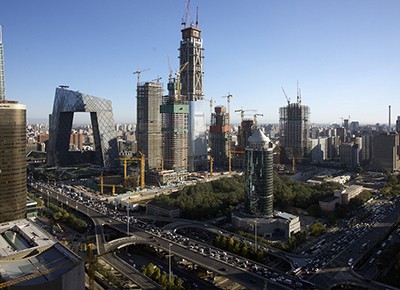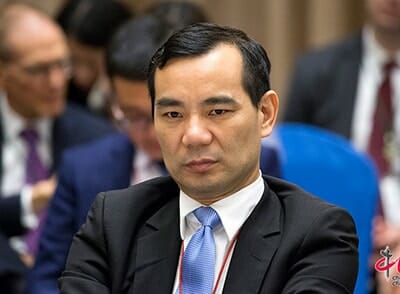
Among Anbang’s domestic assets are a set of three sites near the China Zun project in Beijing’s CBD
On the same day that a court in Shanghai sentenced Anbang Insurance founder Wu Xiaohui to 18 years in prison, a statement to the Hong Kong stock exchange gave an indication of the fate of the once-renegade Chinese insurer’s domestic real estate assets.
Sino-Ocean Land announced to the Hong Kong stock exchange on Thursday evening that it had entered into a joint venture with Anbang Insurance that would give the state-owned mainland developer control over a joint venture company that would take over at least some of the insurer’s real estate assets in China.
In the stock exchange announcement Sino-Ocean said that it would, “establish a strategic cooperation relationship with Anbang, and actively promote cooperation between the Group and Anpang and its subsidiaries in their respective areas of strengths.”
According to the announcement, Anbang had agreed to transfer a 50 percent stake in its Beijing Bangbang Zhiye subsidiary (北京邦邦置業有限公司) to Sino-Ocean, which is an affiliate of China’s COSCO shipping conglomerate,
Sino-Ocean Steps in After Anbang Chairman Sent Away

Anbang chairman Wu Xiaohui has more to worry about now than his property assets
The joint venture, which according to the statement is to be managed by Sino-Ocean executives, has the goal of managing and disposing of Anbang’s set of commercial and residential properties in China. Anbang has effectively been under the control of Chinese regulators since chairman Wu Xiaohui was first detained in June of last year.
In particular, Sino-Ocean said that it would be working with Anbang in its “real estate development business, strategic investment business, real estate financing business, insurance business and pension business.”
The deal appears to set the stage for the Sino-Ocean, which is 29.7 percent owned by Anbang, to take over at least some of Anbang’s real estate holdings and its development activities. The insurer is the second-largest shareholder in Sino-Ocean after China Life which owns 29.9 percent.
The joint venture will be charged with completing the development of Anbang’s portfolio of projects, as well as with operation and eventual disposal of the assets, according to a report in state-run media outlet thepaper.cn.
JV Could Give Sino-Ocean Rights to RMB 11B in Beijing Projects
Among the projects owned by Anbang in China is a site in Beijing’s Nanshan district that the insurer bought for more than RMB 3 billion ($473 million) in January 2017 to construct its new national headquarters.
The insurer also owns a sizable chunk of a prime area in Beijing’s central business district sometimes referred to as the “superblock,” located just south of the CCTV tower in the capital’s Guomao area.
Through joint bids in 2010 and 2011 Anbang acquired stakes in Beijing sites Z5, Z9 and Z10 to the north of Jianguomen Outer Street and east of the Third Ring Road in the city’s central business district. The trio of property projects, which Anbang acquired through three separate consortia, cost their buyers more than RMB 8.2 billion, with Beijing’s Founder Group, China CITIC Group and Beijing Taoli Investment among the insurer’s partners in the projects.
All three sites are among uncompleted projects which are subject to new restrictions put in place by Beijing authorities this year that limit building heights to as low as 100 metres, according to unofficial guidelines communicated by authorities
Also in Anbang’s domestic portfolio are a site for Anbang’s Shenzhen headquarters, the Anbang Chengdu Financial Plaza project in Sichuan, and the Wenzhou Anbang Financial Plaza in Wu Xiaohui’s hometown in Zhejiang province. The insurer also owns a pair of senior living projects in Beijing’s Huairou and Miyun districts.
Fate of Anbang’s Overseas Assets Still Undecided
The statement by Sino-Ocean made no mention of the future of Anbang’s overseas real estate holdings, which include the Waldorf Astoria Hotel in New York, a set of high-end hospitality assets purchased from Blackstone for $5.5 billion in the 2016 Strategic Hotels and Resorts deal, and a range of other properties in North America, Europe and Asia for which the company spent some $16 billion from 2014 to 2017.
A recent report by China’s official Xinhua News Agency cited inside sources at Sino-Ocean as indicating that Anbang officials had been forbidden to discuss sales of the company’s overseas assets with international investors for the past two months.
Leave a Reply